10/15/2023 – Ah yes… the gift of Fall. An opportunity to drag 20 pieces of fossil fuel burning equipment out onto the driveway to perform preventative maintenance and season prep. Some equipment will serve over the winter, others will endure the winter in an unheated storage shed. One of the preeminent maintenance tasks is changing inline fuel filters.
The usual procedure is to move the hose clamps back from the filter’s inlet and outlet, then tug on the neoprene hoses while they grab onto the filter like Chinese finger traps. Finally loosened, an attempt is made to slip in the new filter into place before the machine’s gas tank empties onto the driveway. I am particularly fond of those filters located overhead, where the fuel runs down my arms and pools at my armpits.
Yes, I do have pinch pliers that can close off the lines while making the filter change. Purchased in 1971 from Clifton Auto Parts, the problem was I had only one, which isn’t much help when the job calls for two… which is basically all jobs. Yes, I did plan on buying another pair, but I’ve been busy 52 years and I didn’t want to rush the purchasing decision.
Not wanting to use the no pinched off line approach with the tractor, with ten gallons of diesel fuel… $5/gallon in queue, I checked out Amazon, the QVC of modern generations. A three piece set of metal pliers of differing length was available for $34. Paying $12 in 1971, adjusting for inflation, my old pliers would be selling for $91 in 2023. So $34 was clearly a deal.
I scrolled a little further down the Amazon page,and found a three piece polymer set for only $9, and an all metal tube hose remover for another $9. No, the poly pliers do not have the parallel jaw movement of my old pinch pliers and, no, I didn’t suspect the new set would last the same fifty two years as the old metal counterpart, but I thought they would last long enough.
Yes, there are compromises in the newer generation of products, but there are benefits. Beyond saving a few dollars, they I felt they would be easier on hoses, lighter to work with, and they wouldn’t stick to my hands if they were pressed into service on a -20°F Maine winter day.
No, I am not promoting this product. It is one of those Chinese products that are sold by fifty resellers, differing only in logo. So I just selected the most desperate reseller with the lowest price.
Long story, short. Well, maybe not so short…
The pliers story was intended as a corollary to a firearm story, the multi generational transition from the aesthetics of older traditional firearms to the pragmatism of newer generations of firearms. Yes, Woodstockers Vs. Barrel Nutters.
Pictured above, the Hawkeye is a personal rifle, my favorite rifle of all time. It is often the recipient of my handloading efforts, and it is shot on a regular basis. It is short and stubby, quick pointing, accurate, reliable, and complete for hunting as pictured. Yes, I am a sucker for full walnut stock firearms. It is chambered for a classic cartridge, the 7x57mm of 1892.
Yes, I do carry a picture of the little International in my wallet. Yes, the model is no longer in production. However, until a few years ago, it carried an MSRP of $1,179.
Introduced on 2012, the Ruger American Rifle is one of those new wave upstarts: unbreakable weather proof polymer stock, stout low lift tri-lug lock up, adjustable trigger, quick detachable magazine, Picatinny rail sight mounting, V block bedding for dead nuts accuracy, quick twist rifling to stabilize heavy for bore bullets, barrel nut barrel fitting… OK, those are some nice features… if you’re into that sort of thing. And, yes, its $599 MSRP is half that of the Hawkeye International.
A key spec table below. Note – ignore the American’s short length of pull and short overall length. It is a compact model, but the rest applies to the standard Ruger American Rifle as well.
| Ruger Model |
Hawkeye International |
American Rifle Compact |
| Type of Action | Bolt Action 2 Lug 90° Lift |
Bolt Action 3 Lug 70º Lift |
| Feed Type |
Controlled |
Push |
| Caliber | 275 Rigby (7x57mm) |
7mm-08 Remington |
| Magazine Capacity | 4 |
4 |
| Magazine Type | Internal Box |
Single Column Detachable Box |
| Barrel Length | 18.5″ |
18″ |
| Rifling Twist Rate | 1:8.5 5 Groove RH |
1:8.5″ 5 Groove RH |
| Barreled Action | Alloy Steel – Satin Blue |
Alloy Steel – Matte Blued |
| Stock Type | American Walnut |
Black Synthetic |
| Length of Pull | 13.50″ |
12.50″ |
| Drop at comb | 0.38″ |
0.75″ |
| Drop at heel | 0.75 |
0.75″ |
| Trigger Guard Material | Blued Steel – Hinged Floorplate |
Polymer |
| Front Sight | Ramped Bead |
None |
| Rear Sight | Adjustable – Folding |
None |
| Scope Accommodation | Ruger Mounts – Included |
Picatinny Rail |
| Trigger Pull | Fixed LC6 / 4 Lbs 1 Oz | Adjustable 3 To 5 Lbs |
| Weight of Firearm | 6.5 Lbs |
6.0 Lbs |
| Overall Length | 38.5″ |
36.75″ |
| Safety | 3 Position Wing |
2 Position Tang |
| MSRP | $1,179 (Not in Production) |
$599 |
If you ask me which of the two rifles I prefer, without hesitation, it would be the Hawkeye… even though the Ruger American would outperform the Hawkeye as a hunting rifle, and a range rifle and halve the Hawkeye’s price.
So why would the Hawkeye be my selection? Because it is pretty, and it’s accurate, and it is reliable, and it hangs out with me, and it makes me appear to have greater marksmanship skills than reality would confirm. Loyalty. Chuck is my bud.
While the Hawkeye wins on aesthetics, hands down, the Ruger American wins on… most everything else. Which leaves me only one way to justify my Hawkeye preference, and to restore my image of Spock like wisdom and integrity. I must demonstrate that the Hawkeye’s 7x57mm cartridge has ballistic superiority over the Ruger American Rifle’s 7mm-08 Remington cartridge. How would I do that? By overstating the potential of the 7x57mm Mauser and manipulating the data, of course.
The onset of bias
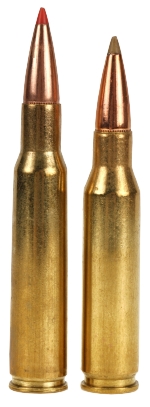 With factory ammunition, the 7x57mm 140 grain load’s rated muzzle velocity runs between 2,650 fps and 2,700 fps. The SAAMI assigned MAP is 51,000 psi, intended for use in rifles of the day, 1892.
With factory ammunition, the 7x57mm 140 grain load’s rated muzzle velocity runs between 2,650 fps and 2,700 fps. The SAAMI assigned MAP is 51,000 psi, intended for use in rifles of the day, 1892.
With factory ammunition, the 7mm-08 Remington 140 grain load’s rated muzzle velocity runs between 2770 fps and 2850 fps. The SAAMI assigned MAP is 61,000 psi, or just under 20% higher than the 7x57mm.
In comparing the two cartridge, as most hunters and target shooters would experience, the 7mm-08 Remington is ballistically superior to the 7x57mm. That would be unbiased and I would have to go through life, defending my Hawkeye choice, without a factual legs to stand on. Yes, just like political ideology.
But why should the 7x57mm be handicapped because of its age, and its 100+ year old association with 19th century vintage Mauser, while the 7mm-08 get the benefit of its association with newer firearm material and process technology? Of course not. That’s like… age discrimination. It would only be fair to bring the 7x57mm up to more modern specs, on par with the 7mm-08 Rem…. even if only 1 in 16731 shooters handload for their 7x57mm rifles.
And there is more… potential, not bias
The 7x57mm, at 59.5 grains, has approximately 8% greater gross powder capacity than the 55.0 grain 7mm-08 Remington. But none of that really matters, as a bullet shank displaces some of that volume when ammo is assembled. Joe, I can hardly wait to see what you write next!..!!. Me too!..!! We’ll both be seeing it for the first time.
What is wrong with me and why am I being so glib? First of all, I am almost always glib. Are you new here? Secondly, I just got my new property tax bill and the first heating oil/propane drop of the season. Additionally, the trend line on my IRA is falling so fast it has friction burns. Much of that glibness is actually mild hysteria. Anyway….
The 7x57mm case is 0.200″ longer than the 7mm-08, and the 7x57mm cartridge overall length is 0.265″ longer. In concert with the Hawkeye’s 30-06 Springfield length action, 7x57mm bullets are not required to be seated proportionately as deeply as the 7mm-08 and the short action Ruger American Rifle.
Subsequently, bullet type and weight to bullet type and weight, the 7x57mm has greater net powder capacity than the 7mm-08, a difference greater than the 8% greater gross case capacity difference previously identified. Net powder capacity is the case volume, minus the space occupied by a seated bullet. Net capacity differences between cartridge are of greater consequence than gross capacity differences.
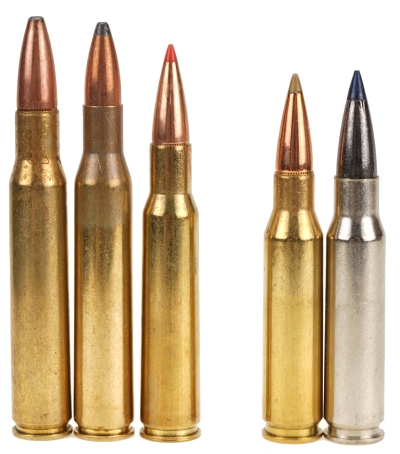
Above, for cartridge size context, and because everyone likes pictures. L-R: 30-06 Springfield, 270 Winchester, 7×57 Mauser, 7mm-08 Remington, 308 Winchester parent case. Why is the 270 Winchester in the picture? Fun fact – 7x57mm brass can be made by running a 270 Winchester case through a full length sizer, then trimming to length.
The Joe hypothesis… Table alert!..!!
| Bullet Type | Bullet Weight Grains |
7mm-08 Net H2O Grains |
7mm-08 COL” |
7x57mm Net H2O Grains |
7x57mm COL |
7x57mm Net Grains Gain |
% 7x57mm Net Capacity Gain |
| Sierra Pro-Hunter SP | 120 | 52.0 | 2.745 | 56.4 | 2.950 | 4.4 | 8.5 |
| Prvi SP | 139 | 51.3 | 2.765 | 56.6 | 3.030 | 5.3 | 10.3 |
| Berger Hunting VLD | 140 | 47.4 | 2.800 | 53.6 | 3.115 | 6.2 | 13.0 |
| Winchester PP | 150 | 48.0 | 2.800 | 54.0 | 3.105 | 6.0 | 12.5 |
| Speer SP | 160 | 47.5 | 2.800 | 54.6 | 3.175 | 7.1 | 15.0 |
Cartridge overall length was determined by matching each bullet type to each subject rifle using an cartridge overall length gauge. The short action 7mm-08 Rem Ruger American rifle COL was limited by magazine length restrictions at heavier bullet weights.
The 7x57mm cartridge overall length did not encounter magazine length restrictions. Where magazines did not restrict cartridge overall length, all handloads were assembled to assure a minimum of 0.015″ bullet spacing from rifling leades as safe clearance. The American magazine internal length measured 2.843″, the Hawkeye internal magazine length measured 3.427″.
If the 7x57mm Mauser has a real world advantage over the 7mm-08 Remington, theoretically, it should handle an increase in charges over the 7mm-08 Remington by approximately the net capacity advantage, which should result in a proportional increase in velocity… if pressure curves behave. I did say theoretically, didn’t I?
Testing the hypothesis..
At the onset, a decision was made to seat bullets out as far as possible, taking into consideration adequate seating depth, a minimum of 0.015″ clearance from rifling leade and adequate magazine clearance to assure feed reliably. The approach was taken to maximize net powder capacity.
Checking with a COL gauge, with allowance for a margin of safety, the 7mm-08’s COL varied from a low of 2.745″ to a high of 2.873″. However, the Ruger American magazine’s inside length measures 2.843″. Therefore, maximum COL was arbitrarily and capriciously set no greater than 2.800″ or shorter, which is the 7mm-08 Remington SAAMI specification for maximum COL.
The 7x57mm rounds vary from 2.950″ to 3.175″ in COL. With a 3.427″ length internal magazine, the magazine length was not a factor for any loads. COL for each specific bullet was set with 0.015″ clearance from the rifling, with the exception of the 120 grain bullet, which was seated for sufficient case neck retention.
Bullets selected for both cartridges
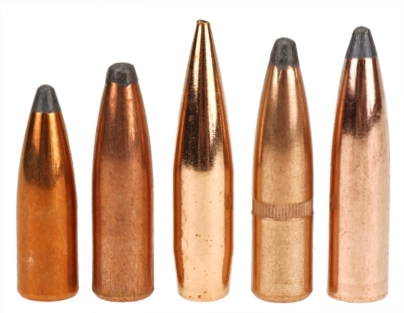
L-R Sierra Pro-Hunter 120 grain, Prvi 139 grain, Berger VLD Hunting 140 grain, Winchester Power Point 150 grain, Speer Hot-Cor Soft Point 160 grain. With the exception of the Berger, these are all low to moderately priced bullets. All perform admirably in hunting applications, even if they do not appeal to our aesthetic senses.
The handloads that followed
Warning: Bullet selections are specific, and loads are not valid with substitutions of different bullets of the same weight. Variations in bullet length will alter net case capacity, pressure and velocity. Primer selection is specific and primer types are not interchangeable. These are maximum loads in my firearms and may be excessive in others. All loads should be reduced by 5% as a starting point for development where cartridges have greater than 40 grains in capacity and 10% for cartridges with less than 40 grain capacity following safe handloading practices as represented in established mainstream reloading manuals. Presentation of these loads does not constitute a solicitation for their use, nor a recommendation.

| Cartridge 7mm-08 Remington Remington |
|
| Firearm | Ruger American Rifle |
| Barrel Length | 18″ |
| Min – Max Case Length | 2.035″ +0.0″/-0.020″ |
| Min – Max Cartridge Overall Length | 2.530″ – 2.800″ |
| Primer | CCI 200 – Large Rifle |
| Bullet Diameter | 0.2843″ +0.0″/-0.003″ |
| Reloading Dies | Redding FL |
| Bullet Type | Bullet Weight Grains |
Net H2O Grains Capacity |
COL” | Powder Type | Powder Charge Grains |
Muzzle Velocity fps |
Muzzle Energy ft/lbs |
| Sierra Pro-Hunter SP | 120 | 52.0 | 2.745 | Reloder 17 | 52.5 | 3101 (C) | 2563 |
| Sierra Pro-Hunter SP | 120 | 52.0 | 2.745 | CFE 223 | 51.0 | 3167 | 2673 |
| Sierra Pro-Hunter SP | 120 | 52.0 | 2.745 | Win 760 | 52.7 | 3037 (C) | 2458 |
| Prvi SP | 139 | 51.3 | 2.765 | Reloder 17 | 50.5 | 2913 | 2620 |
| Prvi SP | 139 | 51.3 | 2.765 | CFE 223 |
49.5 | 2968 | 2720 |
| Prvi SP | 139 | 51.3 | 2.765 | Win 760 |
50.3 | 2881 | 2562 |
| Berger Hunting VLD | 140 | 47.4 | 2.800 | Reloder 17 | 47.8 | 2825 | 2482 |
| Berger Hunting VLD | 140 | 47.4 | 2.800 | CFE 223 | 47.0 | 2888 | 2593 |
| Berger Hunting VLD | 140 | 47.4 | 2.800 | Win 760 | 47.8 | 2861 | 2545 |
| Winchester PP | 150 | 48.0 | 2.800 | Reloder 17 | 47.5 | 2711 | 2449 |
| Winchester PP | 150 | 48.0 | 2.800 | CFE 223 | 46.5 | 2785 | 2584 |
| Winchester PP | 150 | 48.0 | 2.800 | Win 760 | 47.2 | 2745 | 2510 |
| Speer SP | 160 | 47.5 | 2.800 | Reloder 17 | 46.2 | 2619 | 2438 |
| Speer SP | 160 | 47.5 | 2.800 | CFE 223 | 45.5 | 2642 | 2481 |
| Speer SP | 160 | 47.5 | 2.800 | Win 760 | 46.2 | 2680 | 2552 |
| COL reflects adequate seating depth, rifling clearance and/or magazine length clearance. C=Compressed |
|||||||
Warning: Bullet selections are specific, and loads are not valid with substitutions of different bullets of the same weight. Variations in bullet length will alter net case capacity, pressure and velocity. Primer selection is specific and primer types are not interchangeable. These are maximum loads in my firearms and may be excessive in others. All loads should be reduced by 5% as a starting point for development where cartridges have greater than 40 grains in capacity and 10% for cartridges with less than 40 grain capacity following safe handloading practices as represented in established mainstream reloading manuals. Presentation of these loads does not constitute a solicitation for their use, nor a recommendation.

| Cartridge 7x57mm Mauser |
|
| Firearm | Ruger M77 Hawkeye |
| Barrel Length | 18.5″ |
| Min – Max Case Length | 2.235″ +0.0″/-0.020″ |
| Min – Max Cartridge Overall Length | 2.850″ – 3.065″ |
| Primer | CCI 200 – Large Rifle |
| Bullet Diameter | 0.2845″ +0.0″/-0.003″ |
| Reloading Dies | Redding FL |
| Bullet Type | Bullet Weight Grains |
Net H2O Grains Capacity |
COL” | Powder Type | Powder Charge Grains |
Muzzle Velocity fps |
Muzzle Energy ft/lbs |
| Sierra Pro Hunter SP | 120 | 56.4 | 2.950 | Reloder 17 | 55.5 | 3195 | 2721 |
| Sierra Pro Hunter SP | 120 | 56.4 | 2.950 | CFE 223 | 54.5 | 3194 | 2719 |
| Sierra Pro Hunter SP | 120 | 56.4 | 2.950 | Winchester 760 | 55.2 | 3106 | 2571 |
| Prvi SP | 139 | 56.6 | 3.030 | Reloder 17 | 53.5 | 3013 | 2803 |
| Prvi SP | 139 | 56.6 | 3.030 | CFE 223 | 52.5 | 3018 | 2812 |
| Prvi SP | 139 | 56.6 | 3.030 | Winchester 760 | 53.5 | 2879 | 2559 |
| Berger VLD Hunting | 140 | 53.6 | 3.115 | Reloder 17 | 51.7 | 2974 | 2750 |
| Berger VLD Hunting | 140 | 53.6 | 3.115 | CFE 223 | 50.8 | 2980 | 2761 |
| Berger VLD Hunting | 140 | 53.6 | 3.115 | Winchester 760 | 51.5 | 2934 | 2677 |
| Winchester PP | 150 | 54.0 | 3.105 | Reloader 17 | 51.0 | 2886 | 2775 |
| Winchester PP | 150 | 54.0 | 3.105 | CFE 223 | 50.0 | 2859 | 2723 |
| Winchester PP | 150 | 54.0 | 3.105 | Winchester 760 | 51.0 | 2819 | 2648 |
| Speer SP | 160 | 54.6 | 3.175 | Reloder 17 | 50.5 | 2771 | 2729 |
| Speer SP | 160 | 54.6 | 3.175 | CFE 223 | 49.5 | 2784 | 2754 |
| Speer SP | 160 | 54.6 | 3.175 | Winchester 760 | 50.5 | 2718 | 2625 |
| COL reflects adequate seating depth, rifling clearance and/or magazine length clearance. | |||||||
Comparison between 7mm-08 Remington and 7x57mm handloads
| Bullet |
Bullet Weight |
Powder Type |
7mm-08 Charge Grains |
7x57mm Charge Grains |
7x57mm Charge Δ Grains |
7x57mm Charge Δ % |
7mm-08 MV FPS |
7x57mm MV FPS |
7x57mm MV FPS Δ |
7×57 MV FPS % |
| Sierra Pro Hunter SP | 120 | Reloder 17 | 52.5 | 55.5 | 3.0 | 5.7 | 3101 | 3195 | 94 | 3.0 |
| Sierra Pro Hunter SP | 120 | CFE223 |
51.0 | 54.5 | 3.5 | 6.9 | 3167 | 3194 | 27 | 0.8 |
| Sierra Pro Hunter SP | 120 | Win 760 |
52.7 | 55.2 | 2.5 | 4.7 | 3037 | 3106 | 69 | 2.3 |
| Prvi SP | 139 | Reloder 17 | 50.5 | 53.5 | 3.0 | 5.9 | 2913 | 3013 | 100 | 3.4 |
| Prvi SP | 139 | CFE223 |
49.5 | 52.5 | 3.0 | 6.0 | 2968 | 3018 | 50 | 1.7 |
| Prvi SP | 139 | Win 760 |
50.3 | 53.5 | 3.2 | 6.4 | 2881 | 2879 | <2> | 0.0 |
| Berger VLD Hunting | 140 | Reloder 17 | 47.8 | 51.7 | 3.9 | 8.1 | 2825 | 2974 | 149 | 5.3 |
| Berger VLD Hunting | 140 | CFE223 |
47.0 | 50.8 | 3.8 | 8.1 | 2888 | 2980 | 92 | 3.2 |
| Berger VLD Hunting | 140 | Win 760 |
47.8 | 51.5 | 3.7 | 7.7 | 2861 | 2934 | 73 | 2.6 |
| Winchester PP | 150 | Reloder 17 | 47.5 | 51.0 | 3.5 | 7.4 | 2711 | 2886 | 175 | 6.5 |
| Winchester PP | 150 | CFE223 |
46.5 | 50.0 | 3.5 | 7.5 | 2785 | 2859 | 74 | 2.6 |
| Winchester PP | 150 | Win 760 |
47.2 | 51.0 | 3.8 | 8.0 | 2745 | 2819 | 74 | 2.7 |
| Speer SP | 160 | Reloder 17 | 46.2 | 50.5 | 4.3 | 9.3 | 2619 | 2771 | 152 | 5.8 |
| Speer SP | 160 | CFE223 |
45.5 | 49.5 | 4.0 | 8.8 | 2642 | 2784 | 278 | 10.5 |
| Speer SP | 160 | Win 760 |
46.2 | 50.5 | 4.3 | 9.3 | 2680 | 2718 | 38 | 1.4 |
I do not see the proportional charge weight increases and velocity in the 7x57mm as I had hoped. There are some larger increases in performance over the 7mm-08 Remington as bullet weight increases. Performance varies with powder type. CFE 223 appears to extract the most potential from both cartridges, Reloder 17 is a close second and Winchester 760 is inconsistent and low on velocity beneath an acceptable pressure ceiling.
Checking net cartridge capacity yielded a more meaningful number than gross cartridge case capacity, but net capacity is not the same as capacity utilization. For net case capacity to be meaningful, a case 100% full charge would have be within pressure limits. They were not.
In some cases compressed charges did result in 100% capacity utilization. In other circumstances, only 92% of available capacity could be utilized before pressure maxed out. Capacity was not fully utilized, but there was not enough room to move to the next slower powder. The 7x57mm did hold a slight ballistic edge, but not enough for a deer to be more intimidated if I showed up with it, rather than a 7mm-08 Rem.
Both cartridge have a lot to offer, especially in a shortish barrel rifle. All of them, the 7mm-08, 7x57mm/275 Rigby are unfairly diminished in capability by many publications.
On believing everything you read…
 The 7mm-08 Remington (left image, near right), operating at 61kpsi chamber pressure, and 7×57 Mauser (Near Left), operating at 51 kpsi, essentially share a near common SAAMI 140 grain bullet velocity standard; respectively 2845 fps and 2820 fps. Keep in mind, the 275 Rigby is the same cartridge as the 7x57mm.
The 7mm-08 Remington (left image, near right), operating at 61kpsi chamber pressure, and 7×57 Mauser (Near Left), operating at 51 kpsi, essentially share a near common SAAMI 140 grain bullet velocity standard; respectively 2845 fps and 2820 fps. Keep in mind, the 275 Rigby is the same cartridge as the 7x57mm.
Cartridges Of The World, a popular source of information, declares the 7mm-08 Remington to be effective on game up to the size of elk. The 7×57 Mauser is listed as effective on all North American game, with the caveat that it may be a tad light for big bear and moose.
Cartridges Of The World, after noting that Bell killed 1,000 elephants with the 275 Rigby, positions the cartridge as limited to deer hunting, or other thin skinned game under 200 lbs!..!! It is amazing how much or little power can be garnered with a just a name change.
I think Cartridges Of The World got it right for both the 7mm-08 Remington and 7x57mm with their 7x57mm applications note, with the exception of light for moose assessment. Moose are taken in Maine with just about every centerfire cartridge, including big bore revolver rounds.
I perceive moose to be less dangerous than big bear, as even Maine moose can’t climb trees. I would not hunt big bear with any of them, unless hunting in twos, with me being the faster runner. I’ve had three encounters with game where I was pursued. One involved a grouse, one involved a badger… not the honey variety, and one involved a family of raccoons. So big bear with moderate 7mm cartridge is not on my bucket list.
Hawkeye wins… Did you have any doubts?
If I were headed out to hunt in an harsh environment, with no near resources, I would take… the Hawkeye, knowing the Ruger American might very well be a better choice an on the basis of facts, simplicity and durability.
That unsupported decision would put me on par with 99.9% of the gun owners who buy what appeals to them, then research for justification to stave off others who disagree. There are so many ballistic and firearm overlaps, it is difficult to make a purchasing mistake. Just liking a firearm that suits, that suits your applications, is justification enough. There is plenty of room for the traditional and the new.

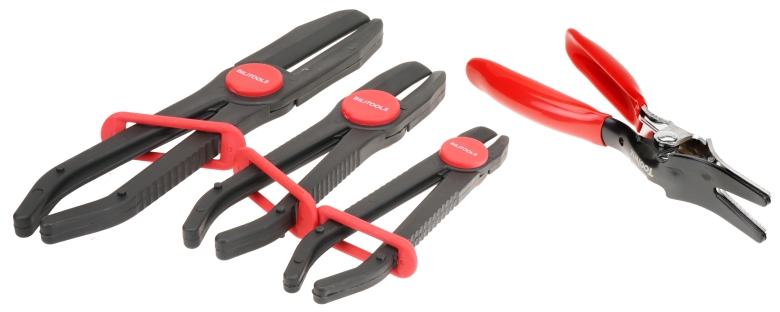
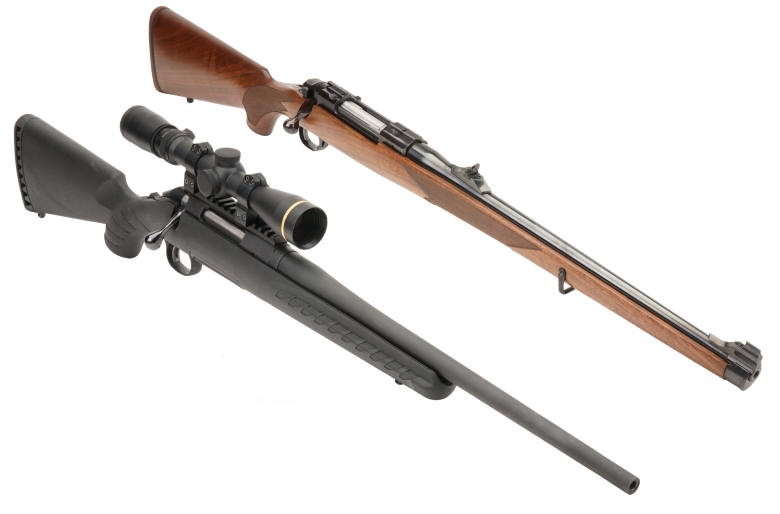


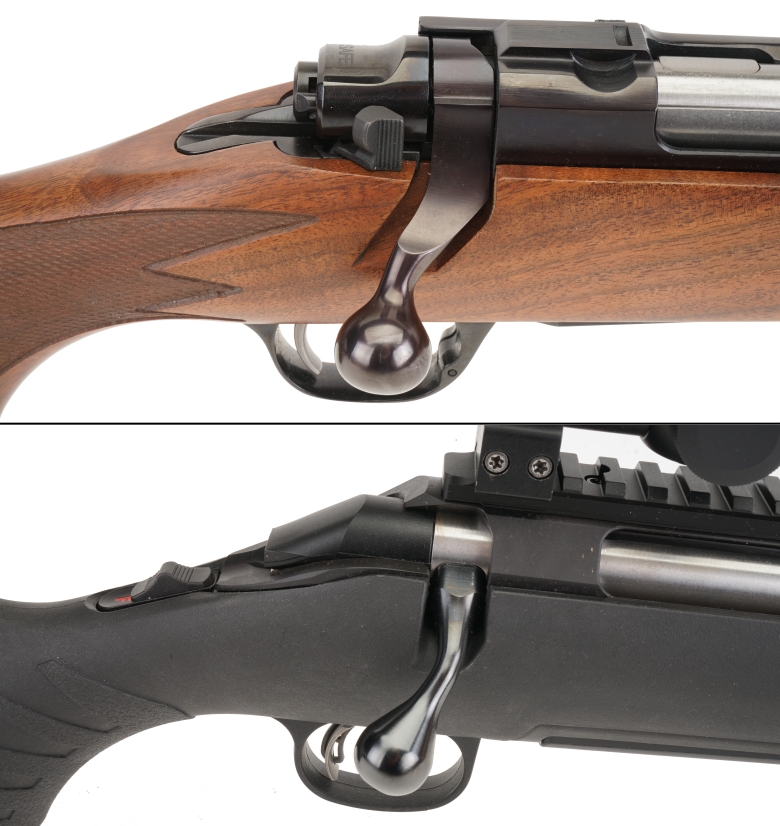
i like the 7/08-7/57 comparison. seems quite fair
i am wondering about 6.5×55/260 rem compared.
We did one a while back. Not exactly the same format, but rifle to rifle, cartridge to cartridge, Bill. It is one I would like to do again.
https://realguns.com/articles/526.htm
https://realguns.com/articles/527.htm
Joe
I took my Winchester Model 70 Super Grade 7×57 recently to Zambia where both my daughter and I took several plains game antelope type animals. The 7mm Mauser is a classic African hunting caliber. The low recoil makes it very pleasant to shoot. I loaded 160 gr Swift A-Frames over H-4350. I also had some 175 gr Nosler Partitions over Ramshot Big Game. Both loads had the same POI at 100 yards. The largest animals taken were Sable, about 500 lbs type critter. The Swift A-Frames were recovered from just under the skin of the opposite shoulder and looked like text book expansion and weight retention.
Sounds like a heck of a trip, hunting success and presence of family.
Joe